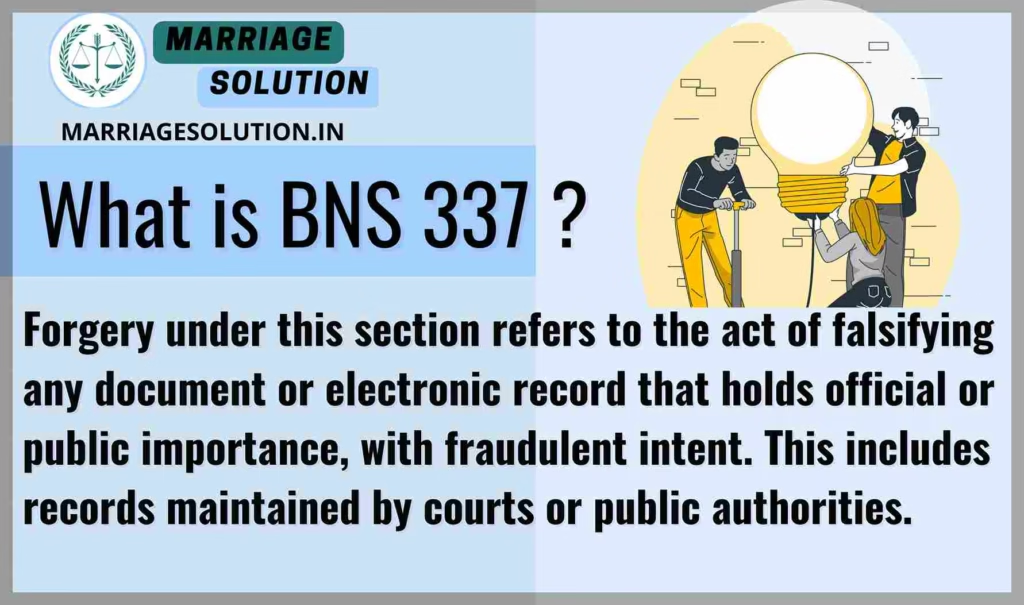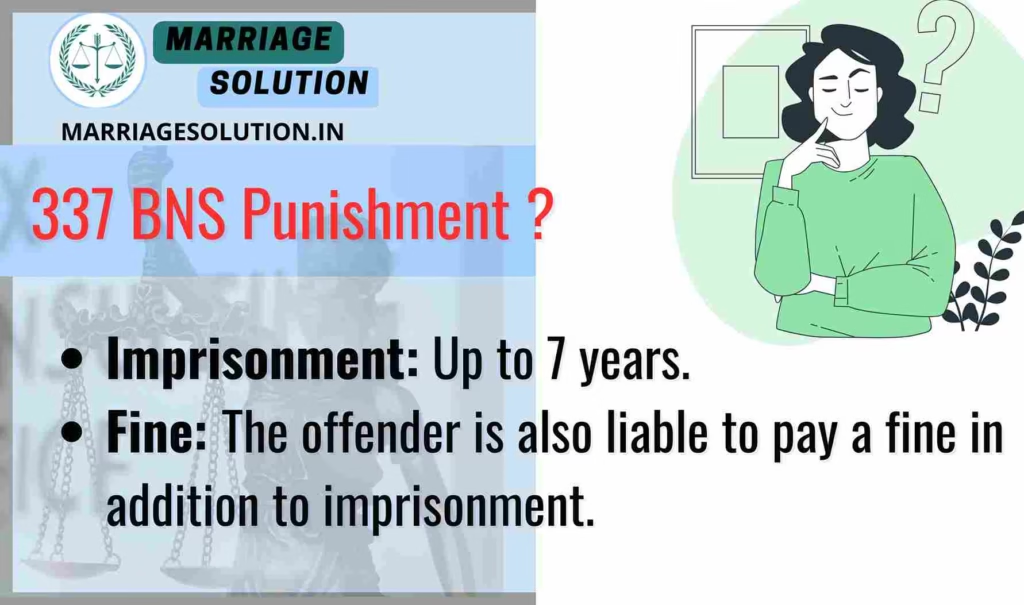Introduction of 337 BNS
337 BNS focuses on the forgery of court records, public registers, government-issued identity documents, and electronic records. This law ensures that critical documents, such as Aadhaar cards, voter IDs, birth or marriage certificates, and judicial records, remain secure and trustworthy. By replacing IPC Section 466, BNS 337 modernizes the law by including both physical and digital records, reflecting the growing need to combat identity fraud, document tampering, and cybercrime.
The Bharatiya Nyaya Sanhita (BNS) Section 337 replaces the old Indian Penal Code (IPC) Section 466.
What is BNS Section 337 ?
Forgery under this section refers to the act of falsifying any document or electronic record that holds official or public importance, with fraudulent intent. This includes records maintained by courts or public authorities.

Under Section 337 of the bns act 2023
“Whoever forges a document or electronic record of public importance — including court records, public registers, certificates made by public servants, or government-issued identity documents — shall be punished with imprisonment which may extend to seven years and shall also be liable to fine.”
1. Meaning of Forgery under BNS 337
- Forgery means creating, altering, or falsifying an official or public document with dishonest or fraudulent intent.
- This includes both physical records (like birth/marriage registers, court orders) and digital records (such as electronic registers or identity databases).
- The law ensures that critical public records remain trustworthy and cannot be tampered with.
Example → Falsifying a birth certificate to claim illegal government benefits.
2. Types of Documents Covered
- Court Records → Judgments, decrees, orders, case files.
- Public Registers → Records of births, marriages, deaths, etc.
- Government Identity Documents → Aadhaar, voter ID, ration card, passport, etc.
- Certificates by Public Servants → Licenses, official permissions, or certificates issued in an official capacity.
- Electronic Records → Any official data or digital certificates as per the IT Act, 2000.
3. Who is Covered under BNS 337?
This law applies to:
- Individuals → Creating or altering public records for personal gain.
- Officials → Misusing their position to tamper with or issue false documents.
- Groups / Syndicates → Forgery rackets involved in fake IDs, certificates, or land documents.
4. Nature of the Offense
- Cognizability → Non-Cognizable (police need permission from a magistrate to investigate).
- Bailability → Non-Bailable (bail is not a right; court discretion applies).
- Compoundability → Non-compoundable (cannot be settled privately).
- Trial → Conducted by a Magistrate of the First Class.
5. Punishment under BNS 337
- Imprisonment → Up to 7 years.
- Fine → Additional fine as determined by the court.
- Severity → Punishment reflects the seriousness of tampering with critical public documents.
6. Examples of BNS 337
Example 1 – Forgery of Identity Document
A person forges an Aadhaar card to apply for subsidies. This act falls directly under BNS 337.
Example 2 – Court Record Forgery
A lawyer alters a judgment in a case file to mislead a client. This is punishable under BNS 337.
Example 3 – Digital Record Forgery
An employee hacks into the government birth register system and changes birth details. This qualifies as forgery under BNS 337.
7. Importance of BNS Section 337
- Protects Public Trust → Ensures official records remain reliable.
- Safeguards Judicial System → Prevents tampering with court documents.
- Protects Identity → Stops misuse of government IDs for fraud or crime.
- Addresses Modern Crimes → Covers digital forgery and electronic records.
Section 337 BNS Overview
BNS Section 337 serves as a safeguard against the forgery of critical records, preserving the authenticity and reliability of documents that form the backbone of legal, administrative, and identity-related systems. The law aims to deter such fraudulent activities and ensure public trust in official records.
10 Key Points of BNS Section 337
1. Definition of Forgery in Public Records
BNS Section 337 addresses the forgery of official documents, including court records, public registers, and government-issued identity documents like voter ID or Aadhaar cards. The law applies to any act of creating, altering, or falsifying such records. It ensures that public trust in official documentation is protected, as these records hold significant legal and administrative value.
2. Inclusion of Court Proceedings
The section covers the forgery of documents related to court proceedings. This includes altering judgments, creating fake case records, or tampering with orders issued by a court. Such acts undermine the judicial process and may obstruct justice, which is why they are treated as a serious offense.
3. Coverage of Identity Documents
Forgery of government-issued identity documents, such as Aadhaar or voter ID cards, is explicitly included under this section. Such forgeries can lead to identity theft, fraud, or misuse of government services, making it crucial to address them with strict legal provisions.
4. Public Registers and Certificates
The law also applies to registers maintained by public servants, such as those recording births, marriages, or deaths. Forging these documents can lead to severe consequences, such as fraudulent claims to property or misuse of legal entitlements. Certificates issued by public servants in their official capacity are also protected under this section.
5. Power of Attorney and Legal Authority
This section includes the forgery of documents granting legal authority, such as powers of attorney or authorizations to initiate or defend lawsuits. Such forgeries can deceive courts or individuals, leading to financial loss or other harm. The law safeguards the integrity of these crucial legal instruments.
6. Inclusion of Electronic Records
The explanation in this section clarifies that registers or documents in electronic form are also covered. This provision ensures that digital forgery, which has become more prevalent with the advancement of technology, is addressed. It aligns with the Information Technology Act, 2000, ensuring comprehensive coverage.
7. Punishment for Forgery
Under this section, the punishment for forgery can extend to seven years of imprisonment, along with a fine. The severity of the punishment reflects the high value placed on public trust in official documents and the significant consequences of forgery.
8. Non-Bailable and Non-Cognizable Offense
Forgery under this section is a non-bailable and non-cognizable offense. This means that bail is not granted automatically, and the police require permission from a magistrate to begin an investigation. This classification highlights the gravity of the offense.
9. Tried by Magistrate of the First Class
Cases under BNS Section 337 are tried by a Magistrate of the First Class, ensuring that the matter is handled by an experienced judicial authority. This guarantees a fair trial and careful examination of the evidence presented.
10. Importance of Protecting Public Records
This section is critical for maintaining the credibility and reliability of public records and official documents. It ensures that individuals and institutions can trust the legal and administrative systems without fear of fraud or tampering. The law aims to deter forgery and protect societal interests.
Examples of BNS Section 337 Violations
Example 1
A person forges an Aadhaar card to claim subsidies under a government scheme. This act falls under BNS Section 337 due to the forgery of an official identity document.
Example 2
A lawyer falsifies court records to manipulate a case outcome. This crime is punishable under BNS Section 337 for forging legal documents integral to judicial processes.
BNS 337 Punishment
- Imprisonment: Up to 7 years.
- Fine: The offender is also liable to pay a fine in addition to imprisonment.

BNS 337 bailable or not ?
- Bailable or Not?: Non-bailable (court discretion required for bail).
- Cognizability: Non-cognizable (police cannot arrest without a warrant).
- Trial By: Magistrate of the first class.
Comparison: BNS Section 337 vs IPC Section 466
| Law | Offense | Punishment | Bailable / Non-Bailable | Cognizable / Non-Cognizable | Trial By |
|---|---|---|---|---|---|
| BNS Section 337 | Forgery of court records, public registers, certificates by public servants, or government-issued identity documents (including digital records). | Imprisonment up to 7 years and fine. | Non-Bailable | Non-Cognizable | Magistrate of the First Class |
| IPC Section 466 (Old) | Forgery of court records, registers of births, marriages, deaths, or certificates made by public authorities. | Imprisonment up to 7 years and fine. | Non-Bailable | Non-Cognizable | Magistrate of the First Class |
BNS Section 337 FAQs
1. What is BNS Section 337?
BNS Section 337 deals with the offense of forging important public or official documents, such as court records, identity documents, and public registers. It aims to maintain the authenticity of these crucial records.
2. What is the punishment under BNS Section 337?
The punishment includes imprisonment for up to 7 years and a fine, reflecting the serious nature of this offense.
3. Is forgery under BNS Section 337 bailable?
No, offenses under BNS Section 337 are non-bailable, meaning bail is not granted as a matter of right but at the court’s discretion.
4. Does BNS Section 337 cover digital forgery?
Yes, it explicitly includes electronic records, ensuring that tampering with digital data is equally punishable.
5. Who conducts the trial under BNS Section 337?
Trials for offenses under this section are conducted by a Magistrate of the first class.
Conclusion
BNS Section 337 plays a vital role in safeguarding the authenticity of court records, identity documents, and public registers. By prescribing punishments of up to 7 years’ imprisonment and a fine, this law emphasizes the seriousness of tampering with official records. It also extends protection to digital records, ensuring security in today’s technology-driven world. With its non-bailable and non-cognizable classification, BNS 337 acts as a strong deterrent against fraudulent practices that could harm individuals, the judicial system, or society at large.
Need Legal Support?
If you are dealing with court cases, marriage problems, or any other legal issue, our team at Marriage Solution – Lawyer Help is here for you. Simply fill out our quick online enquiry form, and we’ll connect you with the right legal expert to support your needs.
Finished with BNS 337 ? Continue exploring the next provisions of the Bharatiya Nyaya Sanhita (BNS), 2023. Each section includes explanations, examples, and plain-language breakdowns for easy understanding.
- 338 BNS : Forgery of valuable security, will, etc.
- https://marriagesolution.in/bns_section/338-bns/
- 339 BNS :Having possession of document described in section 337 or section 338, knowing it to be forged and intending to use it as genuine.
- https://marriagesolution.in/bns_section/339-bns/
- 340 BNS : Forged document or electronic record and using it as genuine.
- https://marriagesolution.in/bns_section/340-bns/
- 341 BNS : Making or possessing counterfeit seal, etc., with intent to commit forgery punishable under section 338.
- https://marriagesolution.in/bns_section/341-bns/
- 342 BNS : Counterfeiting device or mark used for authenticating documents described in section 338, or possessing counterfeit marked material.
- https://marriagesolution.in/bns_section/342-bns/
Full IPC Section List: https://marriagesolution.in/ipc-section-list
All Indian Law & Blogs: https://marriagesolution.in/indian-law/
Full BNSS Section List: https://marriagesolution.in/bnss_section-list
